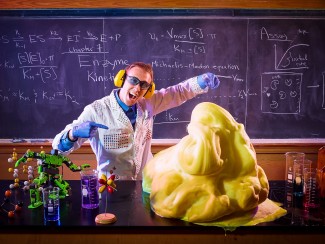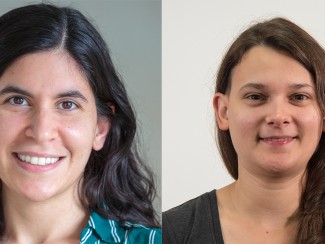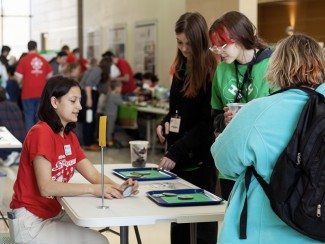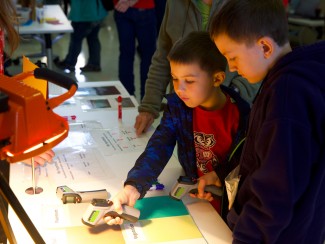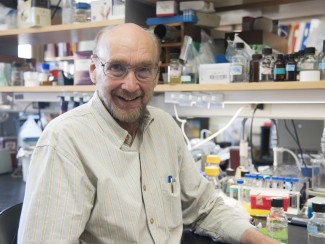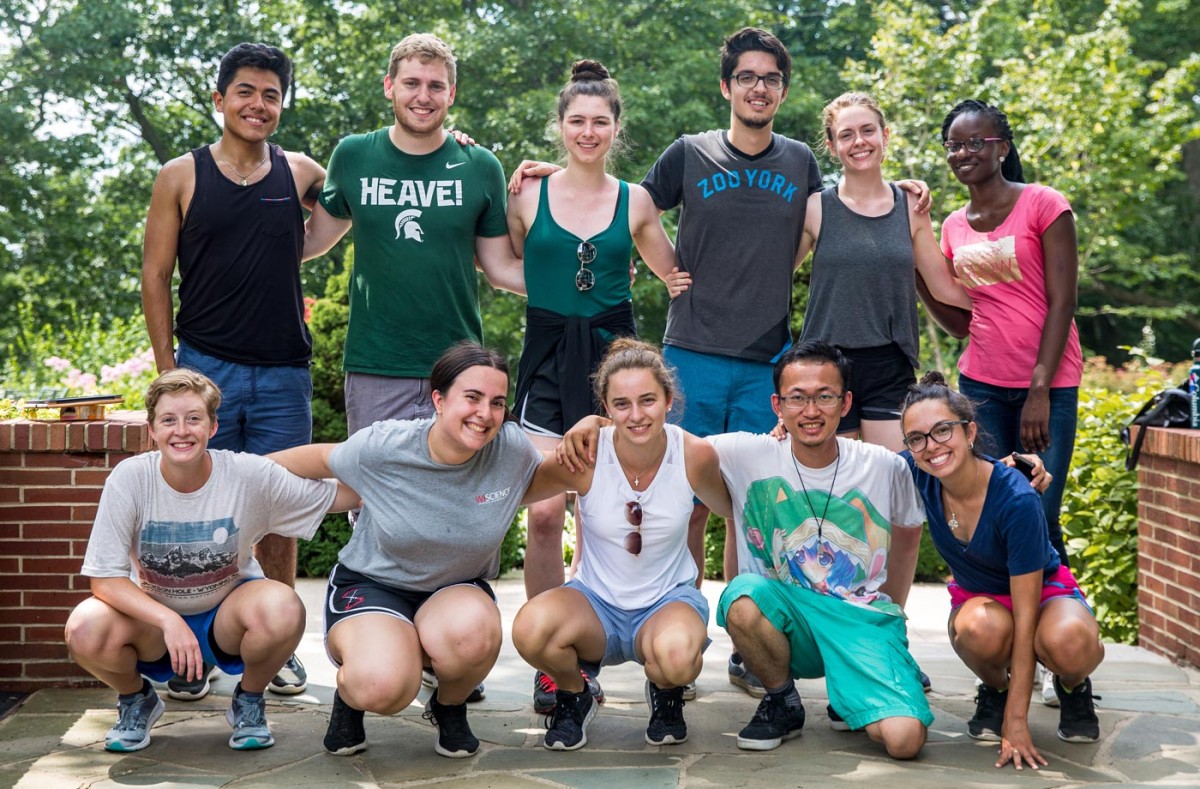
Each year, the Great Lakes Bioenergy Research Center (GLBRC) hosts a group of undergraduate students to participate in the Research Experience for Undergraduates (REU) program, designed to immerse students in research. This summer, 11 undergraduate students joined laboratories at Michigan State University and the University of Wisconsin–Madison.
Mentors guide students throughout the research process, from designing their experiments to presenting their findings on a poster. Students participate in professional development activities, build references for graduate school, and explore research as a potential career.
Halfway through the program, we asked each student to talk to us about their experiences so far.
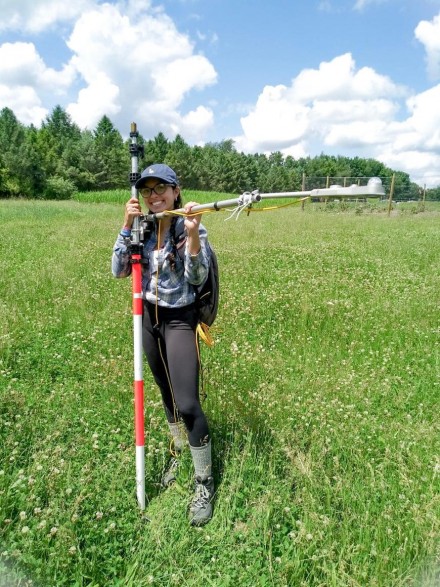
Isabel Arrocha
“I study biological engineering because I love the environment and I would love to find ways to diminish global warming. One way to do this is by reducing the usage of fossil fuels and increasing biofuels. So when I heard about this program, I was immediately interested in participating because it would expand my knowledge on biofuels and their production and sustainability.
My research is on albedo, which can help determine the global warming potential that a certain object has. I'm studying perennial and annual biofuel crops to understand which one has a higher albedo, which translates to a higher sustainability. My favorite part about my research it is not a regular bench lab project; I get to go to Kellogg Biological Station frequently and spend a lot of time outside while I take the albedo measurements of the crops.
Since each person is in a different lab, we're able to discuss everyone else's research and learn about what they're doing in our free time. I hope to learn as much as I can about biofuel sustainability so that one day I can implement its usage back home.”
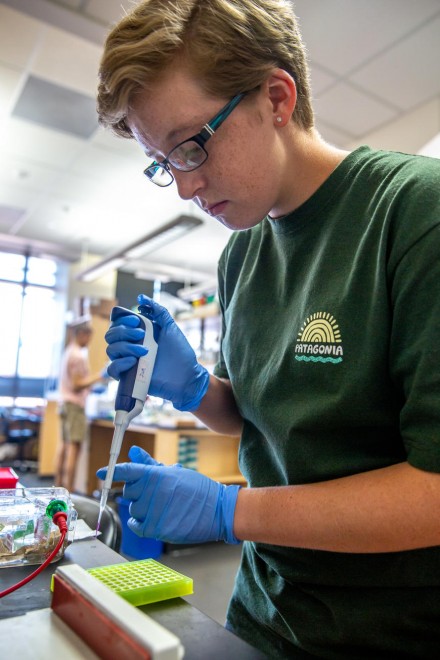
Mallory Spencer
"For as long as I have known about climate change, I have been interested in lessening humanity’s harmful footprints left on the world, as well as in alternative energy sources. This program provided the perfect opportunity to explore the possibilities firsthand and hopefully contribute something to the improvement of our world.
Before participating in the GLBRC’s research, I had never considered all the possibilities for creating renewable energy sources. My research is focused on introducing engineered microbes to the organic matter left over from biofuel production and using the substrate to produce biodegradable, industrially useful chemicals that can potentially replace fossil fuels.
I hope to be able to take what I have learned into my future research and design more experiments that could lead to a decreased dependence on fossil fuels. So far, I have learned so much about the research process and am eager to learn even more."
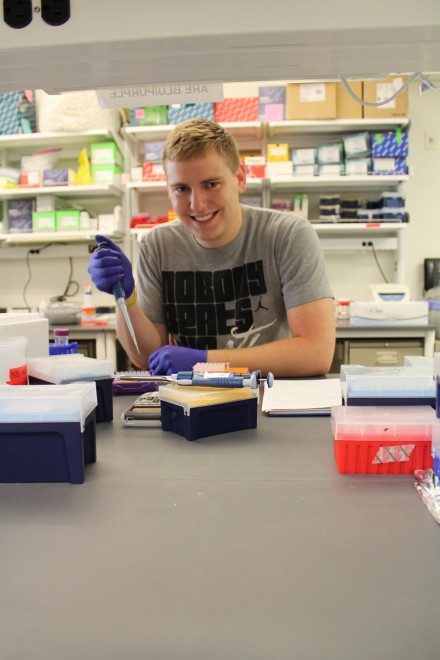
Ethan Woodruff
“The first semester of my junior year of college, I took a biochemistry lab where I got to work on transforming E. coli to make biofuels. This experience is what got me interested in biofuels research and the various methods of producing biofuels.
The research I am currently doing involves symbiotic arbuscular mycorrhiza fungi (AMF). AMF is fungi found in the roots of plants that can positively impact plant health and growth. We identify AMF in switchgrass roots, add the different AMF types to sterile switchgrass seedlings, and measure their growth. The most interesting part of my research is learning how important some AMF types are for switchgrass growth and how the absence of AMF can cause switchgrass to grow substantially less.
The main knowledge I am taking away from this program is experiencing what it is like to work in a university lab and how to run various scientific tests. One thing I have learned from my peers is that it is okay to not know exactly what research to pursue in graduate school. This is a great opportunity to talk to people in other areas of research to learn what I am passionate about.”
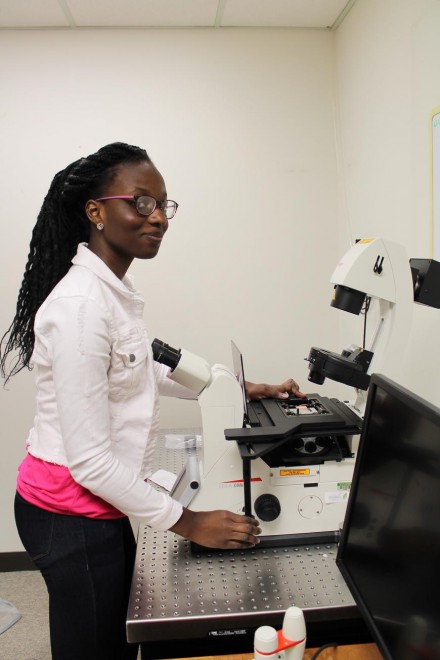
Abisola Ojoawo
"I was intrigued by the different research being carried out at GLBRC, and I thought it would be really cool to be part of a research group working towards developing sustainable fuels and bioproducts.
This summer I will be studying, with the aid of high-tech microscopy, the effectiveness of GVL pretreatment in improving cellulose accessibility. The pretreatment is meant to separate biomass into its various constituents, removing lignin to facilitate conversion into biofuels and other products. It could be the most expensive step in biomass processing, but it has a high potential of reducing costs. One of the things I love about my research is that it requires knowledge from biology, chemistry, and physics, and working with people in these fields.
While being involved in this program, I hope to learn how to incorporate the six scientific method steps into my research and learn how to document and present my research to the public."
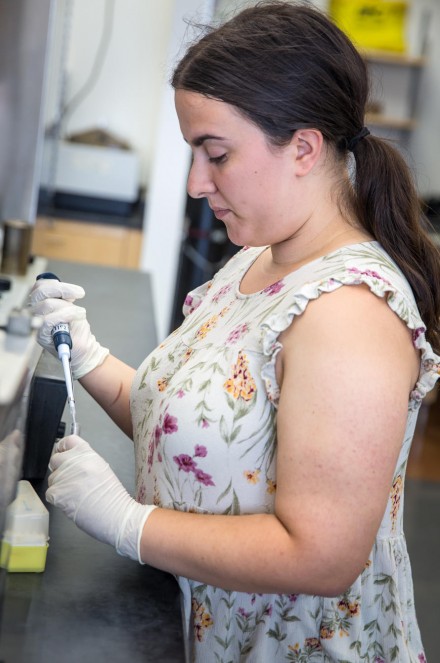
Delia Zumpano
"I chose to participate in this summer program because I want to help make the Earth a greener place, especially considering the rampant pollution caused by fossil fuels. The amount of fossil fuels left on this earth are limited, so we have to turn to more sustainable energy sources like bioenergy, which won’t be as harmful to the environment.
Working under the GLBRC, I am excited to be part of a scientific research community that has real-world applications. This summer I am conducting research on a bacterium called Zymomonas mobilis, which can produce biofuels using a specific metabolic pathway. In the lab, we will be investigating proteins in the pathway to see how we can maximize the efficiency and make as much biofuel as possible.
It’s amazing to see people from across disciplines come together to make the world more sustainable. During the summer, I hope to gain research skills, such as creating an experiment and laboratory techniques. I also hope to improve my science communication skills, whether it be through a poster, a presentation, or a paper."
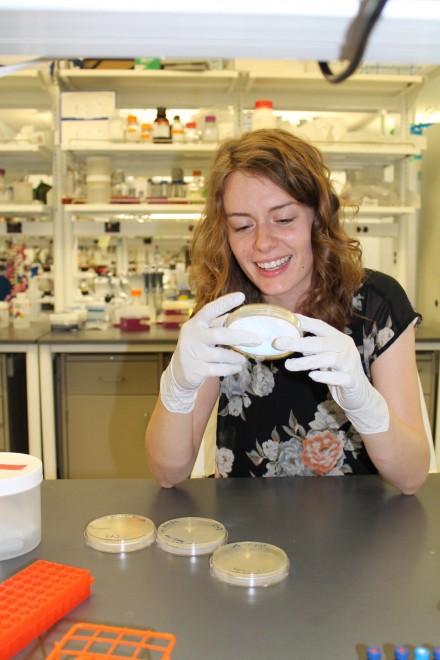
Jaclyn Thompson
“Microbes are simple but efficient systems engineered by millions of years of evolution that are just waiting to be taken advantage of. My love for microbes and my desire to use them to help solve real-world problems led me here to my summer research program with the GLBRC. With warming from anthropogenic emissions on the rise, we need to re-invent our energy – and fast. I think engineering microbes to produce the compounds we need is one way to get us there.
This summer, I'm working with diterpenoids, a diverse class of natural plant products that have useful applications in the pharmaceutical, cosmetic, and bioenergy industries. Diterpenoids are in high demand, but their production is complicated by the difficulty of chemically synthesizing them. We are trying to engineer an amazing bacterium called Shewanella oneidensis that can transfer electrons across its plasma membrane, from the inside of the cell to the outside. When this pathway is reversed, S. oneidensis can take in extra electrons from outside the cell. This is great for us because producing diterpenoids requires the input of electrons.
Working with Emily Lanier has been great because she lets me struggle a bit. Learning to take what I read from the literature and translate that into an experiment was hard! But I'm glad I got to have that experience as I feel more prepared to head off to future labs, whether in graduate school or as a technician, where I may be expected to work more independently.”
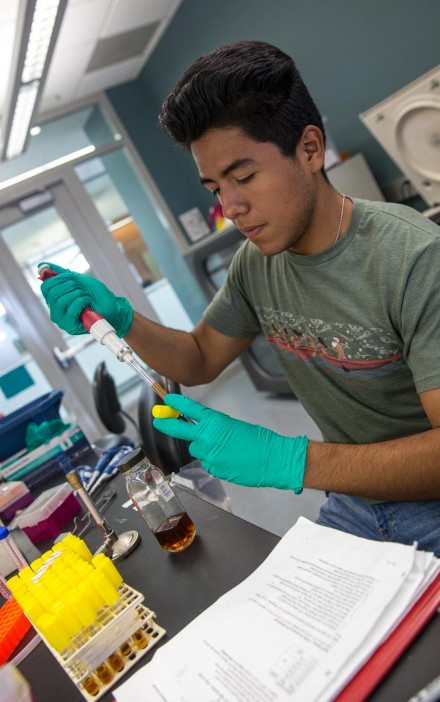
Manuel Alvarez
"My interests and my ambition to further define them is what contributed to my placement at the Hittinger lab. Before my passion for genetics and microbiology, I was largely driven by my ambition to combat climate change. In the Hittinger lab, I feel as if I rediscovered and fused both of my passions into a stronger one.
The fact that the research that I am performing has never been done before is the thing that excites me the most. The Hittinger lab focuses on producing biofuels with various yeast strains. For biofuel production, fermentation is key. My research involves engineering a respiro-fermentive yeast strain, K. lactis, to mainly ferment instead of respire. This yeast strain also has the ability to ferment lactose, which can potentially allow us to use industrial dairy waste as a carbon source for biofuel production.
The most important thing I want to take with me after this program is independent thinking. More specifically, independent scientific thinking for whatever research I may want to pursue in the future."
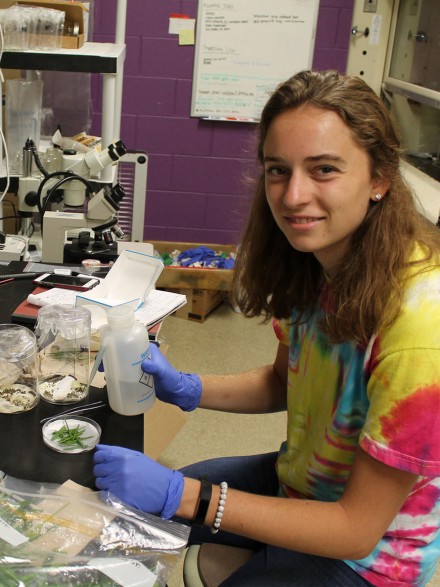
Amanda Lietz
"I knew I wanted to work in crop development, but I wanted to explore the different avenues within agriculture. This program allows me to be involved with most aspects of the bioenergy process. I am entering my senior year of undergraduate, so I have been trying to decide what my career path will be following my education. This program has been a good opportunity for me to explore a different avenue of science that I have never done before.
My research studies the effect of above-ground herbivory on the soil microbial activity of switchgrass. We use the fall armyworm to feed on switchgrass to determine if the carbon allocation is affected. Carbon allocation can affect a plant’s growth and the microbial community below ground, and the microbial community plays a large role in the plant’s defenses and overall health.
Performing new research gets me outside of my comfort zone and forces me to think in a different way. Outside of research, I get to connect with a lot of people from varying backgrounds. It is interesting to hear different ideas on topics. I hope to gain a better idea of how to network with other scientists and industries. This program has given me opportunities to meet experts in the bioenergy field."
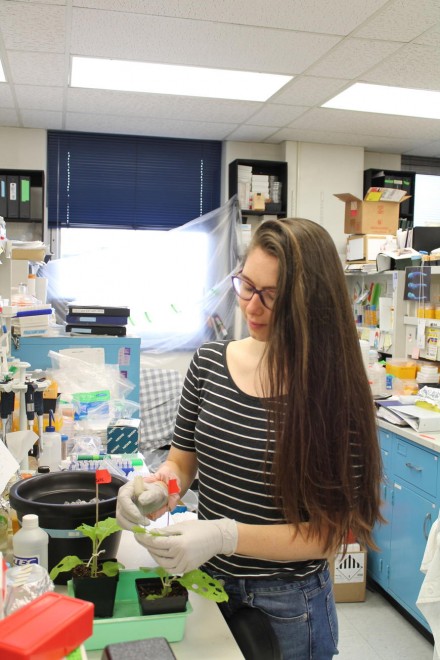
Sarah Herring
"Energy is a basic societal need and in this time of climate crisis, it is imperative that we find ways to avoid continuing the destruction. I chose to participate in the GLBRC summer research program to gain experience in bioenergy research to determine if it is a career field I want to pursue.
My research is focused on increasing cell wall components that are most valuable for biofuel conversion using genetic recombination techniques. I think that this project is really important because these changes have the potential to make it exponentially cheaper and easier to convert biofuel crops into energy, which will make more sustainable fuel options more accessible to a larger part of the population.
This program has immersed me in a scientific community, cultivating my abilities to not just complete lab procedures, but to think like a scientist in every way. Aside from improving my bench lab skills, I have also had the opportunity to grow professionally. The GLBRC program provides countless opportunities for professional development and networking."
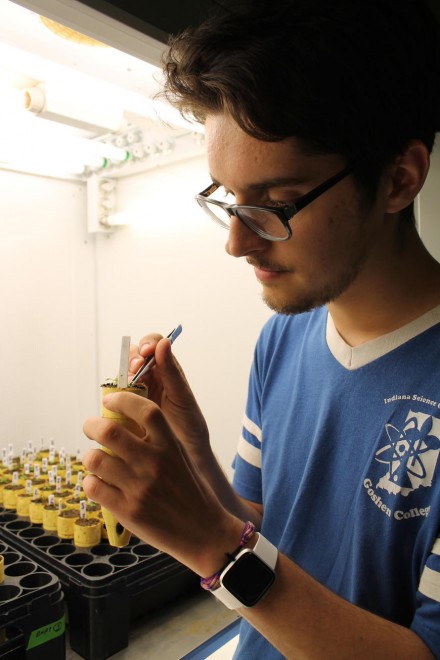
Isaiah Kaufman
"My research is focused on a small molecule called isoprene that many plants emit, and measuring how isoprene affects plant response to cold stress. We are using several mutants of Arabidopsis that have been engineered to emit isoprene and comparing them to the wild type. The most exciting part is looking at the results after a ton of data collection and analysis. Tons of work is boiled down into some charts that reveal a pattern. You get to be the first person to discover this pattern, and that is a pretty cool feeling.
Participating in a program like this teaches you what research is really like. You learn how science is really done. It is filled with exciting experimentation, but also a lot of repetitive work and a lot of failure. You have to learn to push through the mundanity and disappointment to reach the euphoria of discovery.
It has been great working and chatting with people from a diverse array of backgrounds and hearing their stories. We have met with faculty, journalists, businessmen, lawyers, and many more people all related to the sciences. It expands your horizons to see that there are many paths to happiness and success in the sciences depending on what you are looking for."
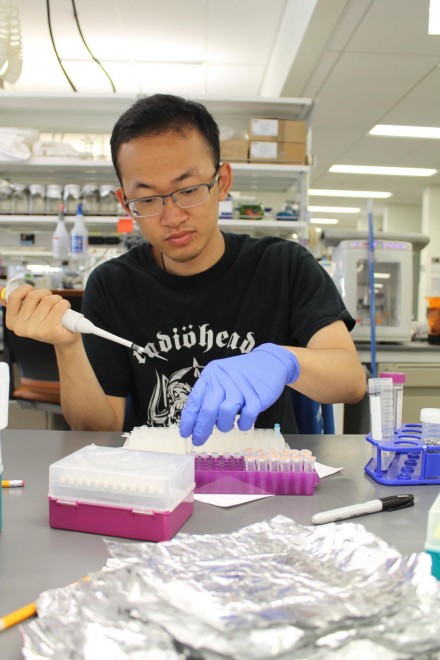
Hieu Pham
"I'm participating in this program because I wanted to learn more about sustainability, especially sustainable biofuels and bioproducts.
My research is about the metabolic features of switchgrass, a lignocellulosic bioenergy crop of interest for the sustainable production of biofuels and bioproducts. We're studying the divergence in cold tolerance among switchgrass cultivars.
The most exciting part is that I have the opportunity to learn about mass spectrometry. I'm also learning how the metabolic and physiological responses intertwine with each other. Broadly, this program has shown me how life at grad school will look."

